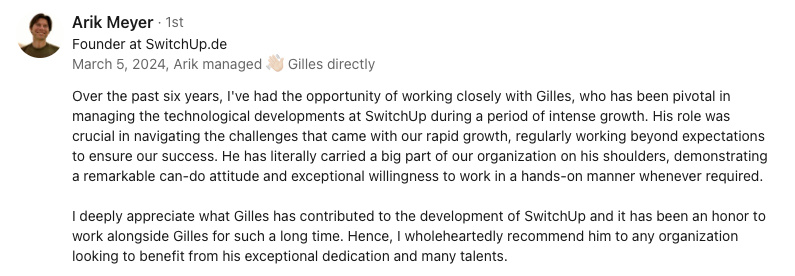Abstract:
The article explores the complexities of the European tech scene for startups, highlighting the interplay between regulatory challenges and cultural diversity as key factors for success. Navigating Europe's unique regulatory environment, notably the General Data Protection Regulation (GDPR), is essential not only for compliance but also as a strategic advantage that can enhance credibility and market position. The article emphasizes the importance of data literacy and the appointment of data protection officers to guide compliance efforts, which can serve as a core branding strategy to appeal to privacy-conscious consumers. Additionally, cultural and language diversity within Europe presents both challenges and opportunities for innovation, with diverse teams fostering creativity and adaptability. Emotional intelligence is crucial for managing diverse teams effectively, enhancing communication and conflict resolution. Adaptability to regulatory changes and leveraging local educational resources are also highlighted as critical components for thriving in Europe's tech landscape. Success stories, such as those from startups in Berlin and Portugal, underscore the potential for growth through strategic compliance, skill adaptation, and cultural intelligence. Overall, the article suggests that by embracing these strategies, startups can transform Europe's challenges into strengths, fostering innovation and competitiveness.
Stepping into the European tech scene can feel like navigating a maze filled with both challenges and opportunities. For startups, the journey is demanding due to Europe's regulatory rules and cultural diversity. Balancing compliance and innovation requires strategic planning and a deep understanding of the landscape. This article explores how startups can transform obstacles into advantages, enhancing their market position and fostering innovation. It provides insights into key success factors within Europe's tech ecosystem.
Understanding the European Tech Landscape
Navigating Europe's tech scene presents unique regulatory, cultural, and language challenges. While global tech faces common hurdles, Europe adds layers of complexity that startups must address to thrive. This section examines two critical aspects of the European startup ecosystem: regulatory compliance and cultural diversity.
Navigating Regulatory Compliance
European startups encounter distinct regulatory hurdles that impact their success. The General Data Protection Regulation (GDPR) is crucial for data handling. Complying with GDPR is not only a legal requirement but also a way to build trust with partners and customers. Startups must adhere to rules like data minimization and informed consent. Mastering these regulations ensures compliance and reinforces credibility.
Skills for Compliance
Data protection officers (DPOs) play a vital role in ensuring compliance. GDPR Article 37 mandates that some startups appoint a DPO. These officers guide startups through complex regulations. Understanding breach notifications and data rights highlights the need for skilled professionals. These regulations can enhance market position by demonstrating a commitment to data protection.
Strategic Advantage Through Compliance
Regulatory compliance offers more than just legal adherence; it can be a strategic advantage. Startups excelling in compliance often gain credibility and competitiveness. Companies that emphasize GDPR in their marketing can appeal to privacy-conscious consumers. This commitment serves as a distinguishing factor. In my experience with Berlin-based startups, leveraging compliance as a core branding and market strategy has proven successful.
Diversity in Language and Culture
Beyond regulations, cultural and language diversity shapes the European startup landscape. Language barriers can pose challenges but also offer innovation opportunities. European startups often operate in multilingual environments, requiring strategic communication solutions. Adopting a common corporate language, such as English, can be beneficial. Embracing cultural diversity opens avenues for creative problem-solving.
Driving Innovation Through Diversity
Cultural diversity drives innovation by bringing diverse perspectives that fuel creativity. Such diversity encourages new approaches, fostering innovation. Startups that leverage diversity excel in adapting products and services to different markets, benefiting from a range of insights and ideas.
Managing Diversity for Success
Managing cultural and language diversity requires empathy and emotional intelligence. Encouraging leaders to develop these skills enhances team performance. Training in cultural competence and inclusive communication creates an environment where all voices are heard. This focus on emotional intelligence fosters a workplace that values diversity, turning communication hurdles into strengths.
Prioritizing Data Literacy for European Startups
In tech and innovation, data literacy is crucial for startups navigating data laws. Understanding data regulations and using information effectively can transform data into a strategic asset.
Grasping GDPR's Impact on Data Strategies
GDPR shapes data strategies in European startups. Its principles, like data minimization, require a high level of data literacy. Leaders must integrate these principles into frameworks to ensure compliance and understanding. For example, GDPR’s Article 5 stresses collecting only essential data, necessitating a critical evaluation of data gathering methods.
Incorporating GDPR into Educational Programs
Integrating GDPR compliance into data literacy programs is essential. Programs should cover GDPR’s core articles, focusing on practical issues like consent management. Strategies can include workshops and exercises that provide hands-on experience. Appointing data protection officers (DPOs) as mentors ensures compliance is a collective commitment.
Utilizing Data as a Strategic Tool
Data, when used strategically, can drive innovation and market insights. Startups aligning data strategies with compliance standards build trust and unlock growth opportunities. Analyzing customer data ethically helps tailor products, driving innovation and fostering a loyal customer base.
Success Stories in Data-Driven Strategies
Some European startups have successfully used data strategies within GDPR’s framework to make market impacts. For instance, in Berlin, startups have refined offerings and expanded by responsibly analyzing data. By identifying customer preferences and market trends, they have been able to pivot quickly and capture new markets. This highlights data’s potential as a driver for business success.
- Berlin Startup 1: Utilized data analytics to refine product offerings.
- Berlin Startup 2: Expanded market reach through ethical data analysis.
The Power of Emotional Intelligence in Diverse Teams
Building Inclusive Communication
In diverse European startups, emotional intelligence (EI) is key for inclusive communication. Active listening and empathy help transcend language barriers, creating a positive environment where diverse voices are valued. Cultural competence training equips leaders to navigate differences effectively, fostering a cohesive team dynamic.
Enhancing emotional intelligence through strategies improves team dynamics. Cultural competence training provides leaders with tools to understand diverse perspectives, fostering empathy. Mindfulness practices help team members regulate emotions and maintain focus in high-pressure situations. These enhancements encourage open dialogue and inclusive interactions.
Enhancing Team Performance
High emotional intelligence in a team improves communication and conflict resolution. Teams with high EI handle disagreements smoothly, using empathy to diffuse tensions. This emotional agility enhances interaction quality and helps achieve goals. Successful teams often outperform others, fostering a work environment conducive to creativity and innovation.
European startups often embody emotional intelligence principles. A startup in Portugal used EI to enhance team dynamics, leading to increased collaboration and innovation. This adaptability helped navigate Europe’s regulatory environments effectively, demonstrating that emotional intelligence is a critical factor for thriving team dynamics.
Embracing Change: Adaptability in European Startups
In Europe’s tech sector, adaptability is key for startup success. Adjusting to regulatory changes is necessary and can be a competitive advantage. This section explores why adaptability matters and how startups can cultivate this trait.
Responding to Regulatory Changes
Navigating Europe's regulatory landscape demands agility to adapt to ever-changing rules. Startups must swiftly update strategies to align with new regulations. This requires a proactive approach to change, where continuous learning and flexibility in operations are essential. GDPR has shaped data handling, requiring a deep understanding and quick adaptation.
Cultivating adaptability is an ongoing process nurtured through continuous learning and flexible practices. Successful startups integrate regulatory compliance training into core programs. This prepares them for current legislation and anticipates future trends. Fostering a culture of flexibility encourages creative thinking and strategy pivots.
Case Studies of Adaptable Startups
Adaptable startups stand out for how they leverage regulatory shifts. In Berlin, companies like TransferWise have adapted to changes while continuing to grow. These companies demonstrate how adaptability can be woven into strategy, navigating complex regulatory waters without halting progress.
- TransferWise: Successfully adapted to regulatory changes while maintaining growth.
- Berlin Startup: Integrated flexibility into operations, thriving amid regulatory shifts.
Continuous learning enhances adaptability, as seen in companies thriving amid regulatory upheaval. TransferWise stays ahead by understanding compliance impact and incorporating flexibility. These examples show that prioritizing learning and adaptability turns challenges into opportunities.
Leveraging European Learning Resources
Utilizing Local Learning Resources
In tech, staying competitive means engaging with local educational platforms and communities. European startups benefit by tapping into these resources. Local learning offers courses specific to regional needs and fosters communities for idea exchange. Platforms like Udacity and Coursera provide specialized programs for executives, focusing on digital transformation.
Successful learning initiatives highlight the importance of local resources. Companies embracing these platforms lead in innovation. Startups integrating continuous learning see improvements in skillsets and creativity. Participating in tech meetups enhances technical abilities and builds networks for collaboration.
- Local Initiative 1: Offers courses tailored to regional needs.
- Local Initiative 2: Provides community platforms for idea exchange.
Fostering a Culture of Lifelong Learning
The Role of Leadership in Lifelong Learning
Leadership is vital for fostering lifelong learning. Leaders must promote continuous skill development. Programs focusing on micro-credentials offer targeted learning essential in today’s fast-paced environment. Effective leaders ensure these opportunities are accessible, encouraging personal and professional growth.
Continuous learning is key for success and adaptability. Companies prioritizing learning are better prepared for industry shifts. Businesses embracing micro-credentials address skill gaps effectively, enabling them to pivot and thrive. By identifying and addressing gaps, startups maintain competitiveness and foster innovation.
Identifying and Bridging Skill Gaps with Local Talent
In European tech startups, identifying and addressing skill gaps is crucial for growth and innovation. Leveraging regional educational resources and local talent effectively bridges these gaps.
Identifying Regional Skill Gaps
Conducting a skill gap analysis is essential for identifying improvement areas. Evaluating the team's skills against strategic objectives uncovers gaps. Techniques like surveys and interviews help. Addressing these gaps requires partnerships with educational institutions offering tailored training.
Local institutions and industry partnerships play a key role in bridging skill gaps. They provide access to specialized courses tailored to European startups' challenges. Collaborating with universities ensures teams have cutting-edge skills. Industry partnerships offer real-world insights and mentorship, valuable for informed decision-making.
Leveraging Local Talent Pools
Tapping into local talent pools offers advantages like cultural alignment and compliance ease. Local hires understand cultural nuances and regulatory environments, enhancing communication and efficiency. This cultural synergy helps startups integrate into local markets.
Case studies highlight effective talent acquisition strategies. Startups prioritizing cultural fit see enhanced team dynamics. Companies like TransferWise attribute success to valuing diversity. These startups attract top talent through competitive benefits and career opportunities.
Success Stories in Skill Adaptation
In European tech, skill adaptation is crucial. Startups like Blinkist in Berlin succeed by adapting workforce training to market needs, resulting in growth. This shows the importance of evolving skill sets to navigate complex landscapes.
Lessons from Diverse Markets
Insights from startups in diverse markets show that a deep understanding enhances skill application. Startups investing in cultural intelligence are better equipped for regional challenges. Leveraging cultural intelligence fosters innovation and broadens reach.
For tech executives, cultural intelligence in training leads to innovative problem-solving and performance. Encouraging continuous skill evolution helps maintain competitive advantages. Adapting skills ensures growth and success in a diverse landscape.
Navigating the European tech scene may seem challenging, but it offers immense possibilities. Embracing regulatory compliance, like GDPR, can enhance credibility. Cultural diversity provides fertile ground for innovation. By fostering emotional intelligence and adaptability, startups can build high-performing teams. Prioritizing data literacy and local learning resources empowers startups to harness data and bridge skill gaps. These strategies can turn Europe’s challenges into strengths.
You might be interested by these articles:
- Future-Proof Skills for Working Professionals
- Essential Skills for Tomorrow's Workforce
- Navigating Work's Next Horizon





